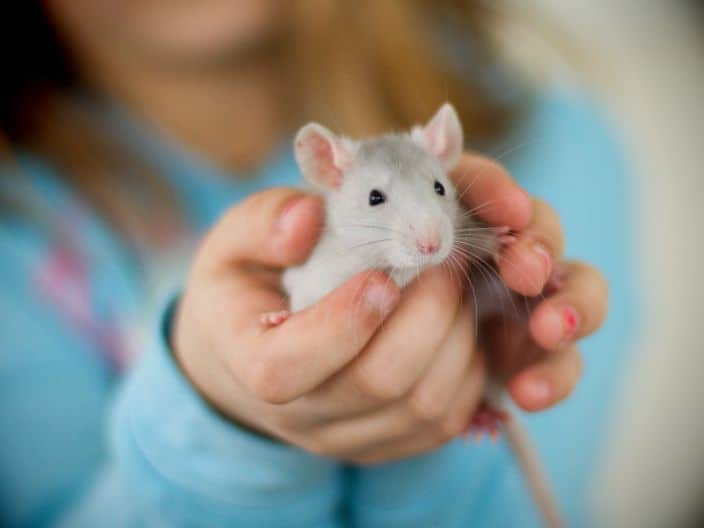Understanding your pet rat’s wants and needs is important, but can sometimes be difficult. One of the questions that I often get from rat owners is whether their furry friends like to be held.
In this blog post, we will delve into the social nature of rats, the importance of handling pet rats, how to hold a pet rat, signs that your pet rat does not like to be held, and a conclusion on understanding pet rat behavior and needs.

Understanding the Nature of Pet Rats
The Social Nature of Rats
Pet rats are social animals that thrive on the company of their own kind. In the wild, rats live in large groups called colonies and rely on each other for survival.
As pets, rats still retain this social nature and enjoy the company of other rats as well as humans.
The Curious and Active Personality of Rats
Rats are known for their curious and active personalities. They love to explore their surroundings, play with toys, and engage in interactive activities with their owners.
Rats also have a keen sense of smell and are highly food motivated, making them easy to train and interact with.
Do Rats Like to Be Held?
Yes, most rats do indeed enjoy being held by humans. They’re very social and affectionate animals that thrive on human interaction and attention. However, there are some cases where rats do not enjoy being held. Luckily, this is not often the case and when it is, the signs are easily noticable.
The Importance of Handling Pet Rats
Building Trust and Bonding with Pet Rats
Handling pet rats is crucial for building trust and bonding with them. Rats are intelligent animals that can recognize their owners and form strong bonds with them.
Regular handling helps rats become comfortable with their owners and build a stronger bond with them.
Encouraging Socialization and Development
Handling pet rats also encourages socialization and development. Rats that are regularly handled and interacted with are more confident and social than those that are not.
Handling also helps rats become more accustomed to different environments and situations.
How to Hold a Pet Rat
The Proper Way of Picking up and Holding Pet Rats
When picking up a pet rat, it is important to do so gently and carefully to avoid injuring them. The proper way to pick up a rat is to scoop them up with both hands, supporting their body and legs.
It is important to avoid squeezing or gripping rats too tightly, as this can cause them to become stressed or anxious.
When holding a rat, it is best to support their entire body and keep them close to your chest or lap. This helps rats feel secure and comfortable.
It is also important to avoid sudden movements or loud noises when handling rats, as this can startle them and cause them to become scared.
Tips on Making the Experience Comfortable and Enjoyable for Both Owner and Pet Rat
To make the experience of holding a pet rat comfortable and enjoyable for both the owner and the rat, it is important to create a calm and quiet environment.
It is also a good idea to offer treats or rewards to rats during handling sessions to help them associate the experience with positive things.
It is also important to avoid forcing rats to be held if they are not comfortable with it. Some rats may be more shy or anxious than others, and it is important to respect their comfort zones and allow them to come to you on their own terms.
Signs That Your Pet Rat Does Not Like to Be Held
Behavioral Cues to Look Out for When Handling a Pet Rat
Signs that your pet rat may not like to be held include squirming, biting, or trying to escape from your grasp. Rats may also make squeaking noises or show signs of distress, such as puffing up their fur or baring their teeth.
It is important to pay attention to your pet rat’s body language and behavior when handling them to ensure that they are comfortable and not stressed.
Understanding and Respecting Your Pet Rat’s Comfort Zone
If your pet rat does not enjoy being held, it is important to respect their comfort zone and avoid forcing them into uncomfortable situations. Instead, try to find other ways to interact with your rat, such as playing with toys or offering treats.
It is also important to ensure that your rat has a comfortable and secure living environment that meets their physical and social needs.
Conclusion
Understanding the social nature and curious personality of pet rats is crucial for providing optimal care and building strong bonds with them.
Rats do enjoy being held and regular handling and interaction helps rats become comfortable and confident, while also encouraging socialization and development.
Proper handling techniques and respect for your pet rat’s comfort zone are key to building a strong bond with them. By creating a calm and positive environment and offering treats and rewards during handling sessions, you can create a comfortable and enjoyable experience for both you and your pet rat.
- How Long Do American Eskimo Dogs Live? Important Factors and Care Tips - September 29, 2023
- Do American Bulldogs Need Grooming? Essential Tips and Care Guidelines - September 29, 2023
- Do Bengal Cats Enjoy Playing? Essential Tips for Keeping Them Active - September 29, 2023